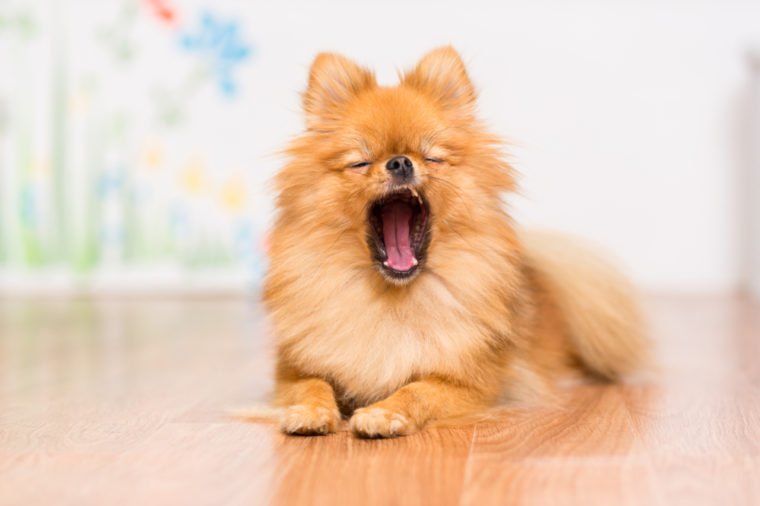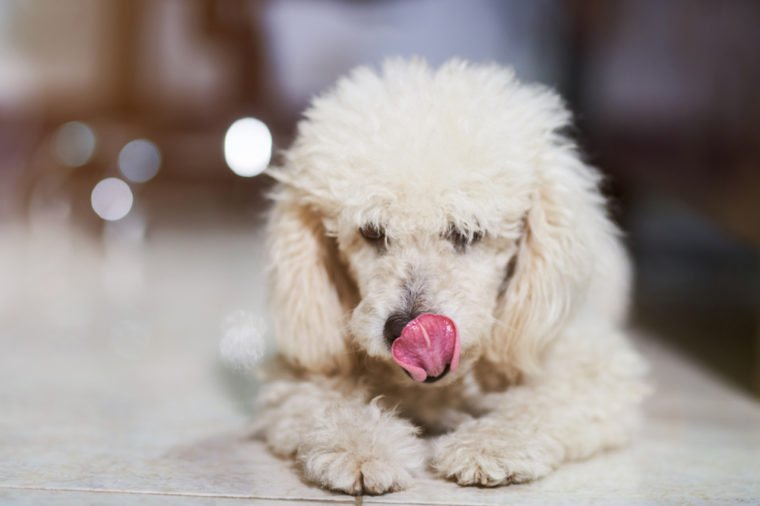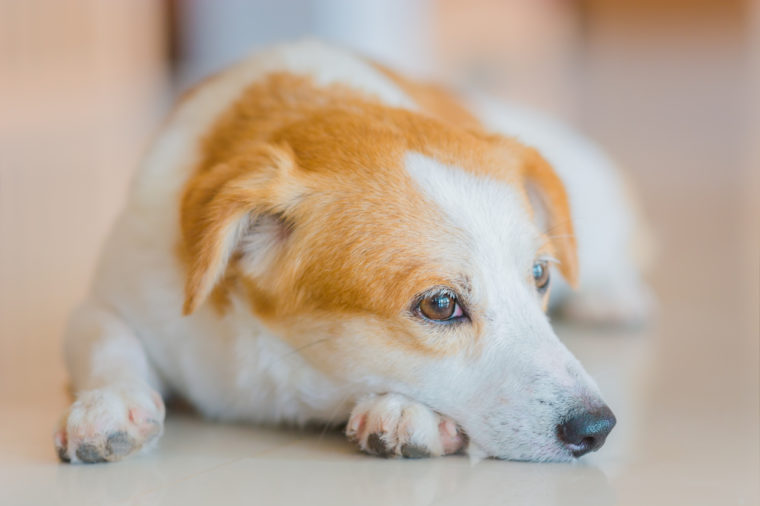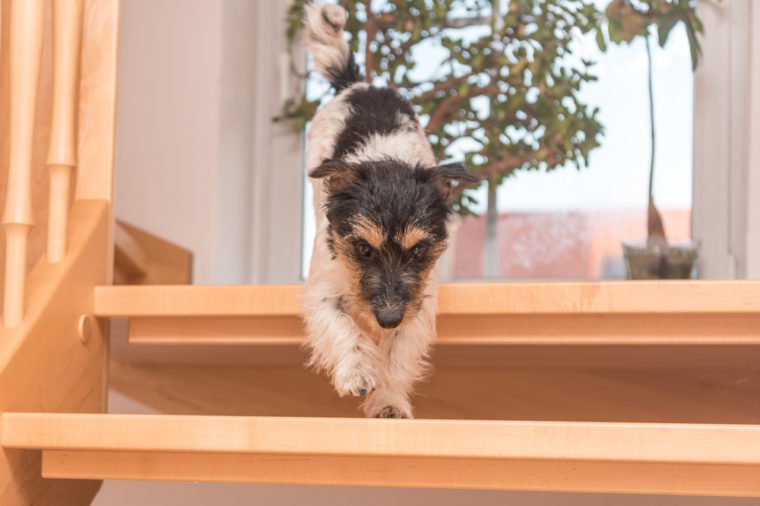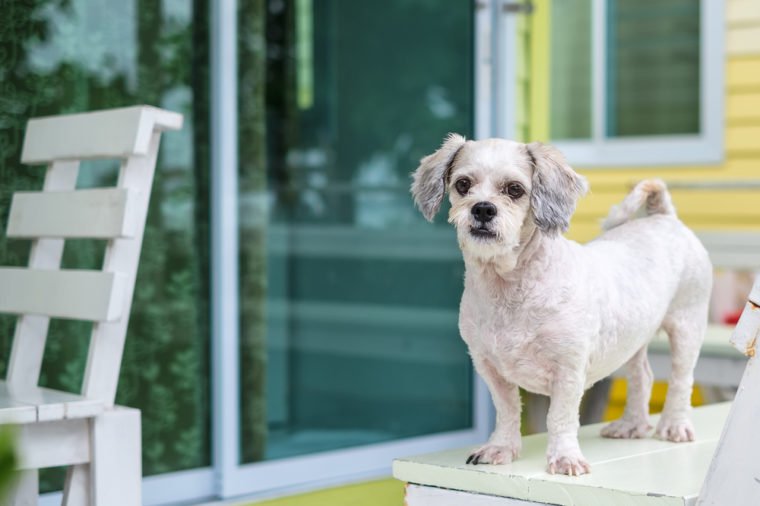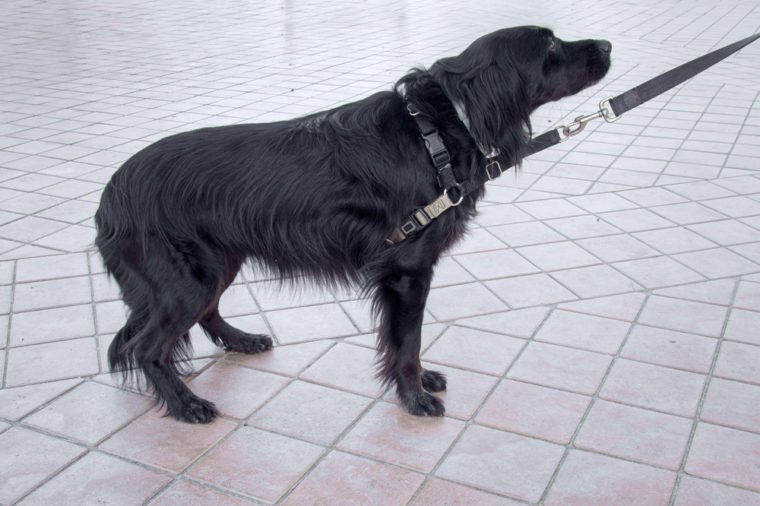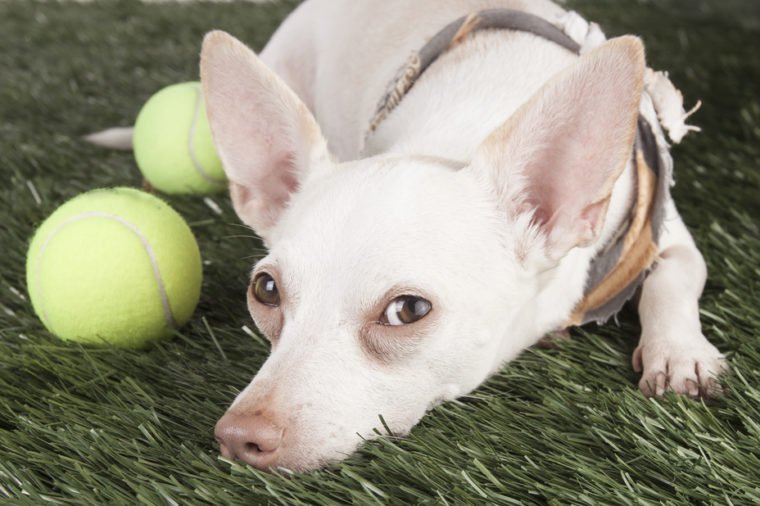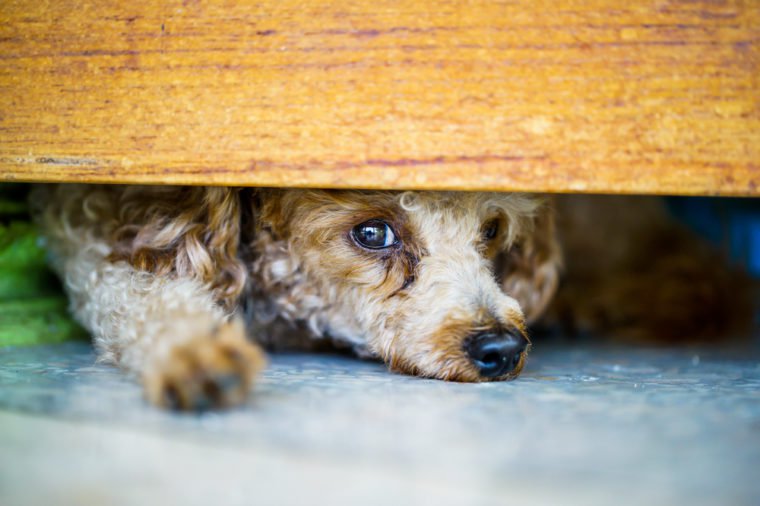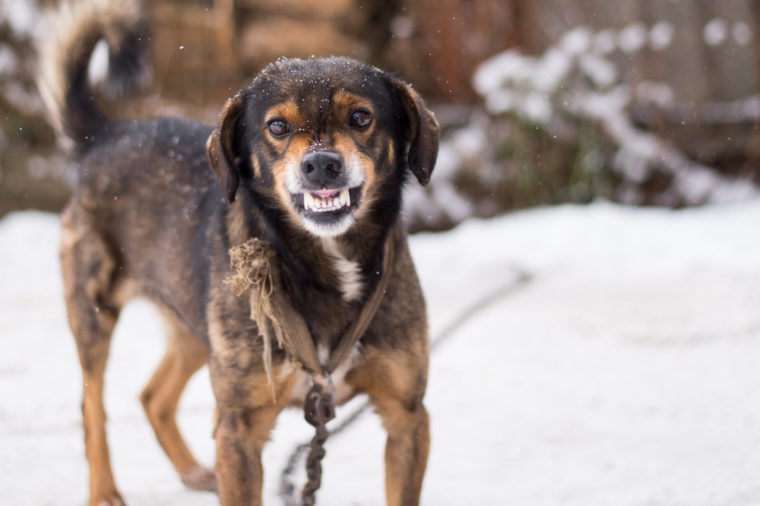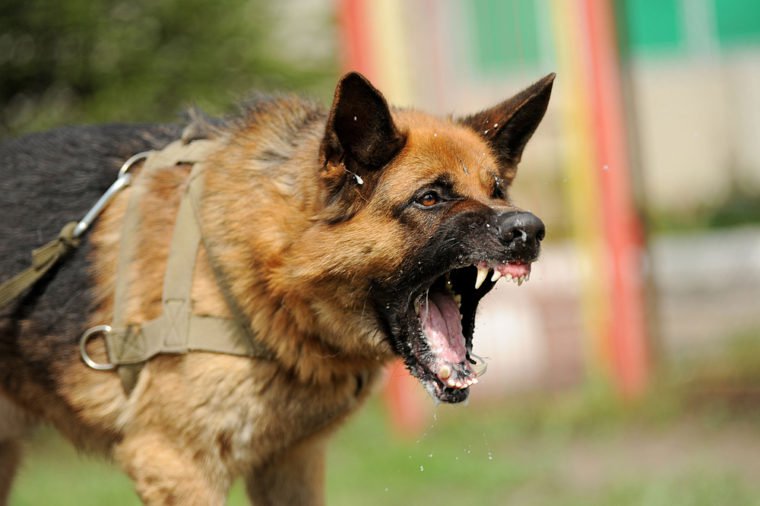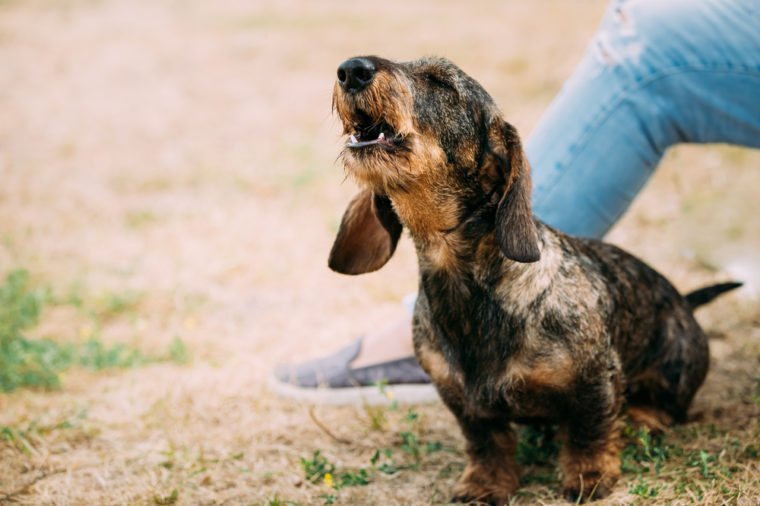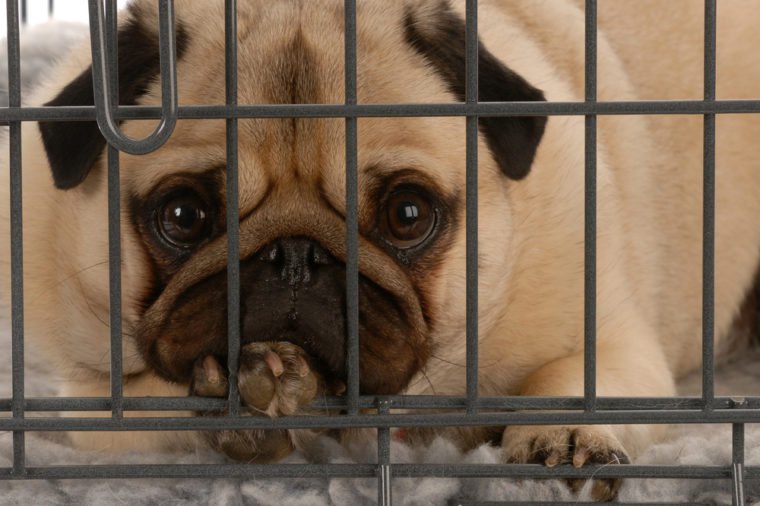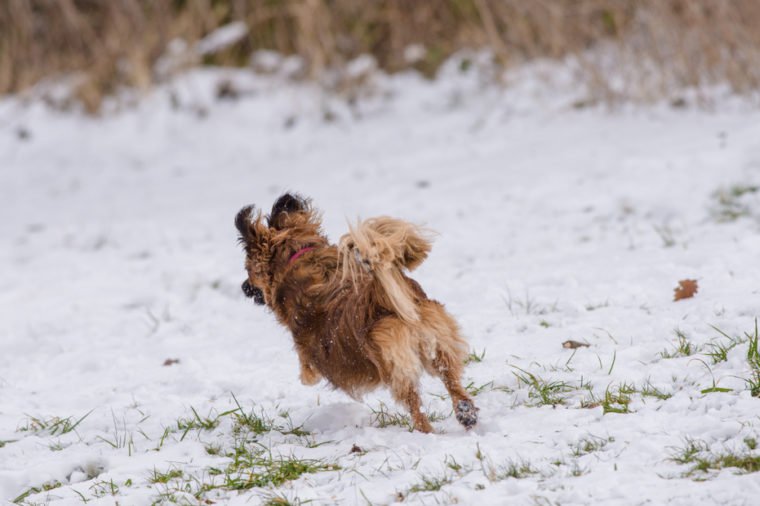No, they won’t slam doors or yell at you, but there are definite indicators that your pooch is angry with you. Read on to find out what they are.
Her ears show she is ~unimpressed~
When a dog’s ears are hanging back, along with a lowered head, closed mouth, and tight lips, it can mean she’s mad at you, says April Olshavsky, American Kennel Club dog evaluator, trainer, and behavioral consultant. “Body language is the only way dogs can communicate with us,” she explains. “By studying your dog’s body language, you can learn a lot about her emotions.” The remedy? Some serious belly rubs and ear scratches. “Chances are, your dog will forget whatever it is you did to upset her with just a few minutes of TLC,” she says.
He’s got a case of the yawns
Contrary to what you might think, big yawns don’t mean your dog is bored with your corny jokes— it’s actually a sign that he is getting stressed, upset, and agitated, says Sara Taylor CPDT-KA, spcaLA director of animal behavior and training. It’s important to pay attention to this signal and immediately remove your dog from the situation he is not coping well with, she says. By the way, smiling at your pup is one sure way to make him happy, too.
She keeps licking her lips and there’s no food nearby
Dogs may show that they’re mad or in distress by licking their nose and lips repeatedly, Taylor says. This is especially true if there’s no drool-worthy food nearby to get their saliva flowing from hunger. One situation she sees this happen a lot is when dogs are being hugged by children or strangers. The solution is simple. “Stop any restraining or hugging,” she says.
He won’t look you in the eye
If a person refused to meet their gaze and turned their back on you, you’d get the message that they were angry loud and clear. It’s the same with dogs, says Erin Askeland, CBCC-KA, CPDT-KA, dog training and behavior expert at Camp Bow Wow. “A dog who is happy and comfortable will likely be willing to make eye contact with his owner and seek out their attention whereas a dog who is angry or upset may avoid this type of interaction and move away from their owner, leave the room, or even sleep in a different area,” she says. How to fix this? Offer calm, quiet time together to help you and your dog relax, say reading a book or listening to soft music, she says. Don’t miss these superpowers dogs have that prove they’re cooler than humans.
She absolutely refuses to sit and stay
Think your dog knows what you want her to do and is refusing in a fit of pique? You may be right. When dogs know cues well, they respond to them, so if your dog suddenly stops responding to a normal cue, that could be an indication that she is upset by something in her environment or by you, Askeland says. Before you get upset too, take a moment and check yourself. Are you feeling stressed, angry, frantic, upset, or sad? Your feelings can influence your dog’s, she says. “Take measures to calm yourself down and this will help your dog feel more comfortable and get back to your loving relationship,” she says.
His back goes rigid and his body is stiff
“When a dog is really, really upset he’ll often go rigid, his body stiff, hard and unmoving,” says Melissa McGrath-McCue CPDT-KA, pet behaviorist and author of Considerations for the City Dog. “It’s almost as if he’s saying ‘take one more step, I dare you!’” If you see this combined with flattened ears and wide, alarmed eyes, you need to stay away and step back as your dog is feeling really stressed, mad, and even threatened, she says. Give him his space or he may feel like he has to defend it which can, in some cases, lead to biting, she adds. Smaller dogs may be more susceptible than larger ones to feeling trapped; that’s just one of the many benefits big dogs offer.
His tail is tucked and still
If your pup is in a crouching pose with his tail tucked between his legs, he might be taking your criticism more personally than you’d thought. This posture shows he’s guarded on the defensive. “Dogs, like humans, are emotional creatures,” Olshavsky says. “If you’ve scolded them, or spoke sternly, they can pout like a teenager.” If you see him backed up like this, lower your voice and talk softly and soothingly. “This will re-establish your bond together and will reinforce the trust your dog had in you,” she says.
The whites of her eyes are showing
Let’s be honest, it’s never a great sign when the whites of any animal’s eyes are showing. Whether she’s showing fear, confusion, disgust, illness, or anger, widening of the eyes indicates a high state of alertness and you’d best pay attention. Why she’s upset may be more of a mystery. “It could be something as simple as you’ve forgotten to feed them,” Olshavsky says. To fix this, try giving her a snack. Hangry is a real thing for dogs too.
He is cowering behind the sofa
Most people associate cowering and hiding with fear and while that can definitely be true, fear is also closely linked to anger in dogs, Taylor says. “Cowering indicates a high level of stress,” she explains. “If your dog is also trying to hide and get away this means your dog is overwhelmed.” Your job as a responsible pet owner is to then remove him from the situation before he gets more overwhelmed and acts out. You’ll know it’s working when you see these signs your dog really trusts you.
She lets out a primal growl
“Growling is an obvious but frequently misunderstood sign,” Taylor says, adding that it shows your dog is very uncomfortable and upset. “It is often used as a warning for the purposes of making something stop. For example, he may growl if you’re trying to move your dog from his comfortable bed for late night potty time by using her collar or when a stranger approaches your dog and tries to pet her,” she adds. Resist the urge to yell at or otherwise punish your dog for growling as that damages trust, doesn’t teach your dog appropriate behavior, and can often worsen aggressive behavior, she says.
He goes into beast mode
Just like your roommate who counted out your M&Ms from the communal bag, dogs place a high emphasis on fairness. “Dogs get mad if they have been treated unfairly, and may act instantaneously with bursts of rage,” Olshavsky says. What this looks like may be different for each dog but you’ll know it when you see it. The solution is simple: More exercise. “Dogs need to get that energy out in some way and a daily walk is the perfect way to do it,” she says.
She tells you — loudly
Think dogs don’t have a voice? Then you’ve never seen a puppy kenneled. They may not be able to use words but they can vocalize their displeasure. Whimpering is the canine version of whining, Olshavsky says, and it’s every bit as grating as the human kind. To cut down on whining, set aside a few minutes each day just to play and work on tricks, she says. Give her your attention when she’s not whining and she’ll learn that whimpering/whining doesn’t work.
He groans like an old man with kids on his lawn
Yes, some dogs actually groan in frustration when they don’t get their way, Olshavsky says. “Some dogs are quick to do this, while others reserve it for times when they are especially upset,” she explains. A major cause of groaning? Getting locked in their crate, outside, or somewhere else far away from their beloved humans. It’s fine to banish your dog during certain times or from certain areas but make sure you’re giving him plenty of regular time with you every day.
She pees in your shoes
“Dogs can definitely be spiteful when they are mad,” Olshavsky says. “The dog wants you to know you’ve upset him so he will do something he knows will get a reaction out of you.” This means finding whatever you love—your new shoes, your favorite couch pillows, your hidden treats—and destroying them, leaving the mangled evidence as proof of their anger. Instead of returning with anger yourself, make sure your pup has plenty of stimulating toys she can chew on whenever she feels that destructive urge, she adds.
He stays just out of arm’s reach
Don’t expect an angry, “Bad human! Go!” but dogs do have plenty of ways of telling you to keep your distance because they are not happy with you right now. This can mean he darts away from you or it can also be a hard stare, flattened ears, paw lift, sharp barks, or a raised tail among other signs, Askeland says. “Dogs are typically good at indicating when they are unhappy and want you to go away, so it’s important to pay attention to these signs,” she says. Instead of chasing him down, let him cool down and come to you when he’s ready. “Don’t force any interaction on your dog if they are upset with you,” she says.




